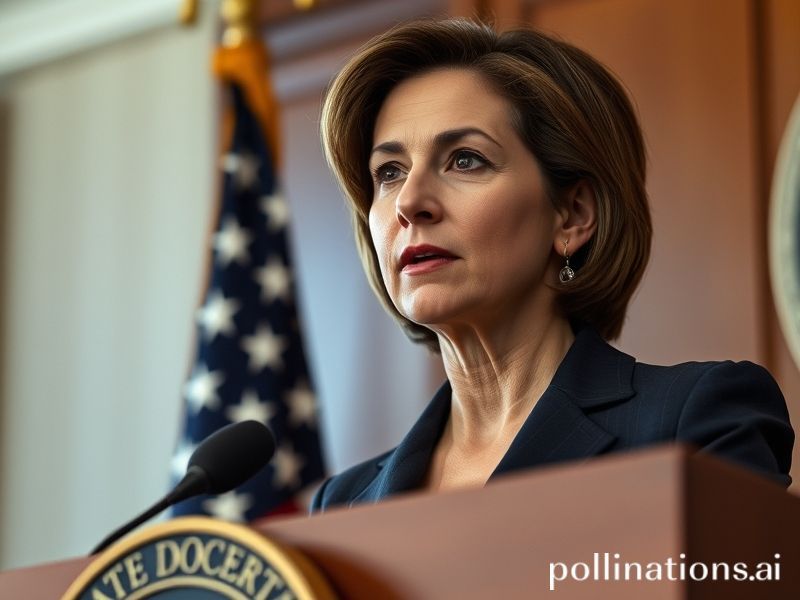Morgan Ortagus: America’s Jet-Set Hawk and the Global Echo Chamber She Never Leaves
The Curious Geopolitical Afterlife of Morgan Ortagus
By “Buckshot” Blaise, Senior Correspondent, Dave’s Locker
Some people leave government and fade into lucrative obscurity—board seats, defense-contractor sinecures, the occasional discreet yacht christening. Others refuse the quiet life, preferring to ricochet across cable-news soundstages like a diplomatic pinball. Morgan Ortagus belongs firmly in the second camp, and the reverberations are being felt far beyond the Beltway’s bottomless brunch circuit.
For the uninitiated: Ortagus served as State Department spokesperson from 2019 to 2021, a tenure that coincided with the Trump administration’s habit of treating foreign policy like performance art. She delivered talking points with the crisp diction of a former Fox News contributor (which she was) and the poise of a Navy Reserve intel officer (which she also was). In other words, she could scold you for mispronouncing “Qatar” and then calmly explain why selling Riyadh another $8 billion in smart bombs was really an act of tough love.
Yet the post-government Ortagus is arguably more interesting—precisely because Washington’s revolving door now empties onto a global stage. She pops up in Taipei huddling with Tsai Ing-wen, warning—in that same unruffled soprano—that Beijing’s gray-zone bullying could “accidentally” ignite a war nobody can afford. She materializes at Davos panels on “Indo-Pacific Resilience,” gamely pretending that resilience is something you can purchase in bulk like rare-earth minerals. And she has just announced a congressional run in Florida’s 7th district, promising to export her hawkish China script from Foggy Bottom to the House Foreign Affairs Committee—because clearly the world needed more performative bipartisanship on semiconductor embargoes.
From Berlin to Bangalore, analysts track her movements the way commodities traders watch the Strait of Hormuz. Not because Ortagus herself moves markets—though defense stocks do twitch whenever she mentions Taiwan—but because she’s a weather balloon for American neuroses. When she rails against “global appeasement,” foreign ministries from Canberra to Abu Dhabi quietly recalibrate risk models: Is this just campaign bluster, or will the next tranche of U.S. sanctions arrive with her signature? In Seoul, policy wonks place bets on whether she’ll push to redeploy tactical nukes; in Brussels, they simply up their Valium prescriptions.
The irony, of course, is that Ortagus’s brand of muscular rhetoric is most potent when it’s least tethered to actual policy. Sanctions regimes are messy; press statements are surgical. While she lambastes the WHO for “kowtowing” to China, countries in the Global South note that American donations to the same organization arrive months late and 30 percent short. The gap between the sermon and the tithe is where cynicism germinates—and where Ortagus’s real influence lies. She gives anxious allies a narrative they can retail to their own legislatures: “See, even the Americans are worried; we’d better buy more Patriots.”
Meanwhile, Beijing’s wolf-warrior diplomats have discovered that invoking her name is a handy shortcut to nationalist applause. Nothing rallies the home crowd like a clip of an American blonde warning of “CCP aggression” set to thundering PLA drumbeats. In the great propaganda tango, both partners need each other’s choreography.
And so Morgan Ortagus keeps orbiting the planet, a sort of peripatetic scarecrow in patent-leather heels. She frightens some, reassures others, and enriches cable-booking producers from D.C. to Dubai. The joke, if you like your humor darker than Ethiopian coffee, is that in an era when power is increasingly fragmented—when TikTok teenagers can tank currencies and ransomware gangs moonlight as state proxies—the loudest clarion calls still come from people whose primary skill is talking fast on television.
Perhaps that’s the ultimate global takeaway: In the 21st-century bazaar of influence, the commodity in shortest supply is conviction, and the premium product is the appearance of conviction. Ortagus sells it by the caseload. The rest of us—taxpayers, conscripts, semiconductor engineers, and Taiwanese fishermen—get to sift through the packaging, wondering which parts are recyclable and which are just live ordnance.
But hey, at least the ratings are terrific.







